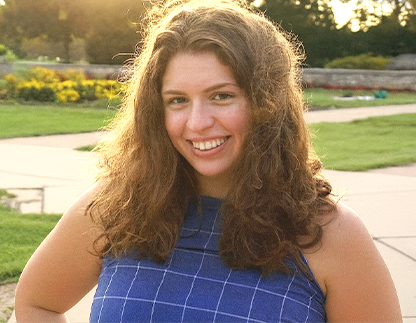Having a new result from an experiment—pushing on that bubble of knowledge—is one of the most rewarding and exciting experiences I can imagine.”
Madeline Melzer
PhD Candidate in the Driskill Graduate Program and Department of Cell & Developmental Biology

Madeline Melzer is a PhD candidate in the Driskill Graduate Program and Department of Cell & Developmental Biology at the Feinberg School of Medicine. Her research focuses on how cells survive disruption, including genetic mutations and cancer treatments. She is a recipient of a Ryan Fellowship.
How would you describe your research and/or work to a non-academic audience?
I study how cells adapt to survive disruptions, focusing on 1) genetic disruptions, like mutations, and 2) pharmacologic disruptions, like a cancer drug treatment.
First, I investigate transcriptional adaptation, where cells compensate for broken/mutant genes by detecting degraded gene products and activating similar genes to restore lost function—a recently discovered cellular backup mechanism that could be harnessed for therapeutics or cell engineering. Second, I examine the dynamics of how rare cancer cells survive anti-cancer treatments and develop resistance, using mathematical models and experimental techniques that track individual cells over time to understand different resistance strategies. Understanding these cellular survival mechanisms could inform more effective cancer therapies and help predict treatment failure.
What do you find both rewarding and challenging about your research and/or work?
My high school chemistry teacher, Mr. Nguyen, used this analogy to describe doing research: if all of human knowledge is a big bubble, scientists doing research push on the edges of that bubble to expand it. Having a new result from an experiment—pushing on that bubble of knowledge—is one of the most rewarding and exciting experiences I can imagine.
At the same time, as Spider-Man's Uncle Ben reminds us, "with great power comes great responsibility." I feel a profound sense of responsibility to society, including the working taxpayers and foundations who fund my research, to work as hard as I can to uncover biological truths that could one day benefit us. I feel very lucky to have the opportunity to do this, but it is a challenge.
What books are on your bedside table?
True Grit by Charles Portis, Catalyst by Tom Cech, and When Einstein Walked with Godel by Jim Holt
What inspires you?
My family who has worked very hard to give me my education.
What did you originally want to be when you grew up?
When I was in elementary school, I wanted to be an astronaut, a "space scientist" like Peggy Whitson or Mae Jemison. When I was in high school, I wanted to be the CEO of a pharmaceutical company so I can take a pay cut to make all prescription drugs cheap. This was why I majored in biochemistry in college—I found after some googling that was what big pharma CEOs studied most frequently, after business, which I knew I did not want to study. Now, I just want to be a scientist on earth.
What advice would you give your younger self or someone considering a similar path?
1) Figure out what you love to do (and what you do not love to do) by trying as much as you are able, and 2) find mentors who share your passions.
What are you most proud of in your career to date?
I am most proud of being a member of the Goyal lab. I feel so lucky to work with all of my lab mates who work so hard and are so excited by science, and to be a student of my mentor Yogesh who has devoted his life to science and helping others learn to do it. My lab and the questions we are trying to answer makes me happy to come in every day. I am also very proud of the students I have come to mentor, although the list is short given my limited experience so far: the rotation students I have worked with have been fantastic, and my undergraduate student, Rohan, is so very curious and clever and fun to work with.
Publish Date: August 19, 2025